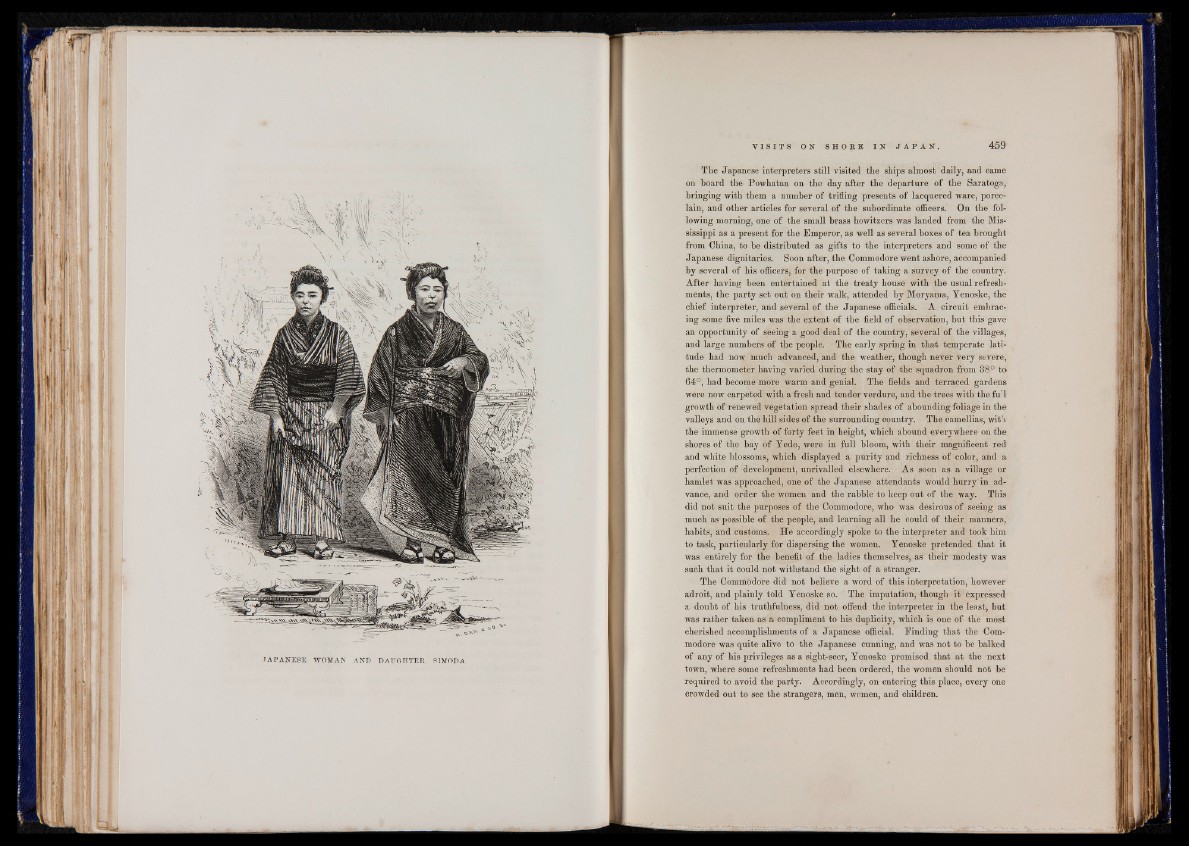
J A P A N E S E W O M A N A N D D A U G H T E R , S I M O D A
V I S I T S ON S H O R E I N J A P A N . 459
The Japanese interpreters still visited the ships almost daily, and came
on board the Powhatan on the day after the departure of the Saratoga,
bringing with them a number of trifling presents of lacquered ware, porcelain,
and other articles for several of the subordinate officers. On the following
morning, one of the small brass howitzers was landed from the Mississippi
as a present for the Emperor, as well as several boxes of tea brought
from China, to be distributed as gifts to the interpreters and some of the
Japanese dignitaries. Soon after, the Commodore went ashore, accompanied
by several of his officers, for the purpose of taking a survey of the country.
After having been entertained at the treaty house with the usual refreshments,
the party set out on their walk, attended by Moryama, Yenoske, the
chief interpreter, and several of the Japanese officials. A circuit embracing
some five miles was the extent of the field of observation, but this gave
an opportunity of seeing a good deal of the country, several of the villages,
and large numbers of the people. The early spring in that temperate latitude
had now much advanced, and the weather, though never very severe,
the thermometer having varied during the stay of the squadron from 38° to
64°, had become more warm and genial. The fields and terraced gardens
were now carpeted with a fresh and tender verdure, and the trees with the fuT
growth of renewed vegetation spread their shades of abounding foliage in the
valleys and on the hill sides of the surrounding country. The camellias, with
the immense growth of forty feet in height, which abound everywhere on the
shores of the bay of Yedo, were in full bloom, with their magnificent red
and white blossoms, which displayed a purity and richness of color, and a
perfection of development, unrivalled elsewhere. As soon as a village or
hamlet was approached, one of the Japanese attendants would hurry in advance,
and order the women and the rabble to keep out of the way. This
did not suit the purposes of the Commodore, who was desirous of seeing as
much as possible of the people, and learning all he could of their manners,
habits, and customs. He accordingly spoke to the interpreter and took him
to task, particularly for dispersing the women. Yenoske pretended that it
was entirely for the benefit of the ladies themselves, as their modesty was
such that it could not withstand the sight of a stranger.
The Commodore did not believe a word of this interpretation, however
adroit, and plainly told Yenoske so. The imputation, though it expressed
a doubt of his truthfulness, did not offend the interpreter in the least, but
was rather taken as a compliment to his duplicity, which is one of the most
cherished accomplishments of a Japanese official. Finding that the Commodore
was quite alive to the J apanese cunning, and was not to be balked
of any of his privileges as a sight-seer, Yenoske promised that at the next
town, where some refreshments had been ordered, the women should not be
required to avoid the party. Accordingly, on entering this place, every one
crowded out to see the strangers, men, women, and children.